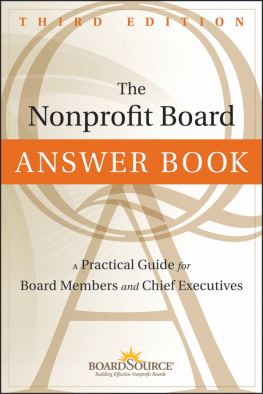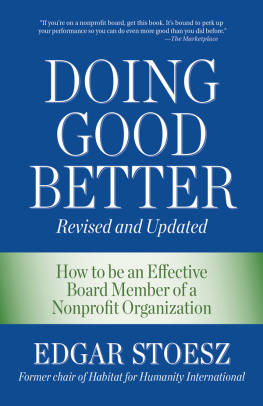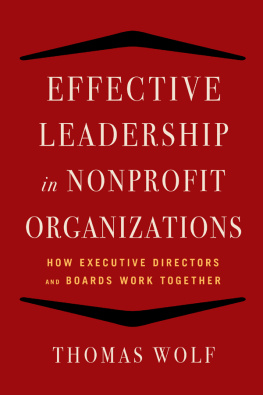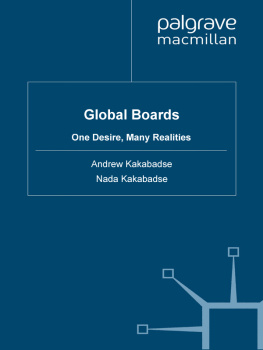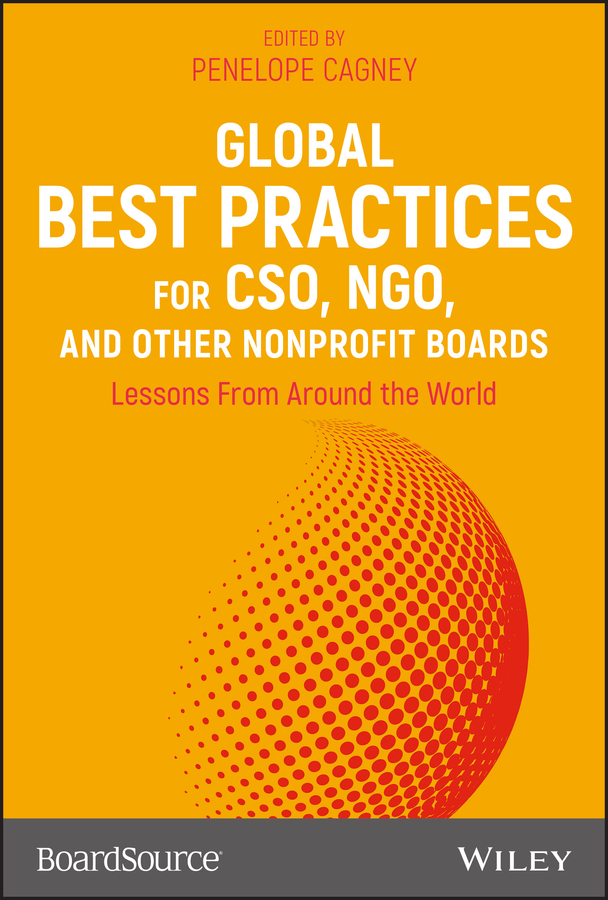
Table of Contents
List of Tables
- Chapter 3
- Chapter 6
List of Illustrations
- Chapter 3
- Chapter 7
- Chapter 8
Guide
Pages
EDITED BY
PENELOPE CAGNEY
GLOBAL BEST PRACTICES FOR CSO, NGO, AND OTHER NONPROFIT BOARDS
Lessons From Around the World
Copyright 2018 by BoardSource. All rights reserved.
Published by John Wiley & Sons, Inc., Hoboken, New Jersey.
Published simultaneously in Canada.
No part of this publication may be reproduced, stored in a retrieval system, or transmitted in any form or by any means, electronic, mechanical, photocopying, recording, scanning, or otherwise, except as permitted under Section 107 or 108 of the 1976 United States Copyright Act, without either the prior written permission of the Publisher, or authorization through payment of the appropriate per-copy fee to the Copyright Clearance Center, Inc., 222 Rosewood Drive, Danvers, MA 01923, (978) 750-8400, fax (978) 646-8600, or on the Web at www.copyright.com. Requests to the Publisher for permission should be addressed to the Permissions Department, John Wiley & Sons, Inc., 111 River Street, Hoboken, NJ 07030, (201) 748-6011, fax (201) 748-6008, or online at http://www.wiley.com/go/permissions.
Limit of Liability/Disclaimer of Warranty: While the publisher and author have used their best efforts in preparing this book, they make no representations or warranties with respect to the accuracy or completeness of the contents of this book and specifically disclaim any implied warranties of merchantability or fitness for a particular purpose. No warranty may be created or extended by sales representatives or written sales materials. The advice and strategies contained herein may not be suitable for your situation. You should consult with a professional where appropriate. Neither the publisher nor author shall be liable for any loss of profit or any other commercial damages, including but not limited to special, incidental, consequential, or other damages.
For general information on our other products and services or for technical support, please contact our Customer Care Department within the United States at (800) 762-2974, outside the United States at (317) 572-3993 or fax (317) 572-4002.
Wiley publishes in a variety of print and electronic formats and by print-on-demand. Some material included with standard print versions of this book may not be included in e-books or in print-on-demand. If this book refers to media such as a CD or DVD that is not included in the version you purchased, you may download this material at http://booksupport.wiley.com. For more information about Wiley products, visit www.wiley.com.
Library of Congress Cataloging-in-Publication Data
Names: Cagney, Penelope, 1956- editor.
Title: Global best practices for CSO, NGO, and other nonprofit boards : lessons from around the world / Penelope Cagney, editor.
Description: Hoboken, New Jersey : John Wiley & Sons, Inc., [2018] | Includes bibliographical references and index. |
Identifiers: LCCN 2017057988 (print) | LCCN 2018010696 (ebook) | ISBN 9781119423201 (epub) | ISBN 9781119423287 (pdf) | ISBN 9781119423270 (cloth)
Subjects: LCSH: Nonprofit organizationsManagement. | Nongovernmental organizationsManagement. | Boards of directors. | Corporate governance.
Classification: LCC HD2769.15 (ebook) | LCC HD2769.15 .G57 2018 (print) | DDC 658.4/22dc23
LC record available at https://lccn.loc.gov/2017057988
Cover Design: Wiley
Cover Image: wektorygrafika/iStockphoto
This book is dedicated with love to my family: Helen, Nate, Jay, Candy, Jimmy, Kemper, Naomi, and Joey.
Acknowledgments
My thanks to BoardSource first for supporting this exploration of global governance; and to my publishing teamAnne Atwood Mead at BoardSource and Brian Neill at John Wiley & Sons. I would also like to thank especially Usha Menon (Singapore and Philippines) who edited the ambitious Asia Chapter; and the contributors: Bekay Ahn (Korea); Consuelo Castro (Latin America); Tariq Cheema (MENA); Louise Coventry (Southeast Asia); Noshir Dadrawala (India); Naila Farouky (MENA); Burkhard Gnrig (ICSOs); Alan Hough (Australia); Miho Ito (Japan); Oma Lee (China); Yinglu Li (China); Krishan Mehta (Canada); Velario Melandri (Europe); Mike Muchilwa (Africa); Darmawan Triwibowo (Indonesia); Garth Nowland-Foreman (New Zealand); Paloma Raggo (United States); Masataka Uo (Japan); and Marilyn Wyatt (Central and Eastern Europe and Eurasia).
Penelope Cagney
CHAPTER 1
Overview
Penelope Cagney
This chapter provides an overview of the bookwho it is for and why it is needed, who the contributors are, the context and framework for the book's content, and an outline of chapters.
WHO THIS BOOK IS FOR
Nonprofits are entrusted with some of the world's most important work, and the scope and size of this sector has expanded tremendously in the past few decades. These organizations seek to solve, often in partnership with other sectors, the biggest problems of the planetnamely, climate change, poverty, hunger and the need for clean water, resolution of war and protection of rights, and promotion of education and health. They are charged, too, with the preservation and promotion of arts and culture and other important issues relating to quality of life.
The need for responsible, informed, and well-equipped governance for nonprofit organizations is critical. This book is intended for those who seek to prepare themselves to provide it. Boards everywhere, composed of impassioned grassroots volunteers, concerned philanthropists, and accomplished community and business leaders, seek guidance on providing quality leadership to nonprofits. This book is also for capacity-building organizations that strive to equip nonprofits in the best way possible to carry out their important tasks. It is also for CEOs and executive directors intending to assist their boards with working at optimal performance levels and for those who teach in, and study, our sector.
INTRODUCTION
While there are political and societal forces tugging us in different directions today, technological innovations, such as social media, have undeniably brought us closer together. Whether we are talking about the nonprofit food bank around the corner that serves the neighborhood or a colossal nongovernmental organization (NGO) that spans continents, the need for good governance is universal. But do we all agree on what constitutes best practice? Little is known about how NGO governance is practiced around the world.
New wealth everywhere is encouraging nations to view their cultures and traditions as the compasses guiding the direction of their philanthropy and civil society. This has value for us all.
There is much to be gained from setting aside preconceived ideas and looking intently for what really works for local people.
Coventry (2017), 55
Even those of us whose interests go no further than our own borders need to examine our preconceived ideas about what is best, because we live in increasingly diverse societies that call for more nuanced approaches to what works. To understand, serve, and include, we need to first confront the limitations of our own cultural biases.
Next page

